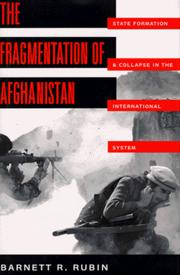Check nearby libraries
Buy this book

Afghanistan has long been a country in turmoil. For decades, imperial powers, Islamic fundamentalists, tribal warriors, and communists have struggled for control of a nation that is geographically and ethnically fragmented. Their conflict reached a peak in the fourteen-year-long civil war that erupted in 1978, a war that resulted in the disintegration of Afghanistan as a state.
This fascinating book is a complete analysis of the Afghan civil war, from the 1978 communist coup to the fall of Najibullah, the last Soviet-installed president, in 1992.
Drawing on interviews and unpublished private and government documents, Barnett Rubin shows how both the communist regime and the mujahidin (Islamic resistance) recruited leaders and mobilized resources for the conflict, and how international changes - from the election of Ronald Reagan to the collapse of the Soviet Union - affected the Afghan state. Rubin argues that the origins, conduct, and resolution of the war were a function of Afghanistan's connections to the international community, for Afghanistan was incorporated into a state system not of its own making, and foreign financial and military assistance transformed both tribalism and fundamentalism to the point that they are as much creations of international conflict as the resurgence of local traditions.
Using theories of state formation and breakdown and of revolution, Rubin provides a comparative framework that makes it possible to integrate this investigation with other studies of Cold War regional conflict and post-Cold War state breakdown.
Check nearby libraries
Buy this book

Previews available in: English
Showing 3 featured editions. View all 3 editions?
| Edition | Availability |
|---|---|
|
1
The fragmentation of Afghanistan: state formation and collapse in the international system
2003, Oxford University Press,Pakistan
in English
- 2nd ed.
0195799852 9780195799859
|
zzzz
Libraries near you:
WorldCat
|
|
2
The fragmentation of Afghanistan: state formation and collapse in the international system
2002, Yale University Press
in English
- 2nd ed.
0300095201 9780300095203
|
eeee
Libraries near you:
WorldCat
|
|
3
The fragmentation of Afghanistan: state formation and collapse in the international system
1995, Yale University Press
in English
0300059639 9780300059632
|
aaaa
Libraries near you:
WorldCat
|
Book Details
Edition Notes
Includes bibliographical references (p. 349-365) and index.
Classifications
The Physical Object
ID Numbers
Source records
Better World Books recordLibrary of Congress MARC record
Internet Archive item record
Promise Item
marc_columbia MARC record
Work Description
"This book examines Afghan society in conflict, from the 1978 communist coup to the tall of Najibullah, the Last Soviet-installed president, in 1992. This edition, newly revised by the author, reflects developments since then and includes material on the Taliban and Usama bin Laden. It is a book that now seems remarkably prescient.".
"Drawing on two decades of research, Barnett R. Rubin, a leading expert on Afghanistan, provides a fascinating account of the nature of the old regime, the rise and fall of the People's Democratic Party of Afghanistan, and the troubled mujahidin resistance. He relates all these phenomena to international actors, showing how the interaction of U.S. policy and Pakistani and Saudi Arabian interests has helped to create the challenges of today.
Rubin puts into context the continuing turmoil in Afghanistan and offers readers a coherent historical explanation for the country's social and political fragmentation."--BOOK JACKET.
Community Reviews (0)
Feedback?| November 15, 2023 | Edited by MARC Bot | import existing book |
| August 18, 2020 | Edited by ImportBot | import existing book |
| July 31, 2020 | Edited by ImportBot | import existing book |
| February 13, 2020 | Edited by MARC Bot | remove fake subjects |
| December 10, 2009 | Created by WorkBot | add works page |












